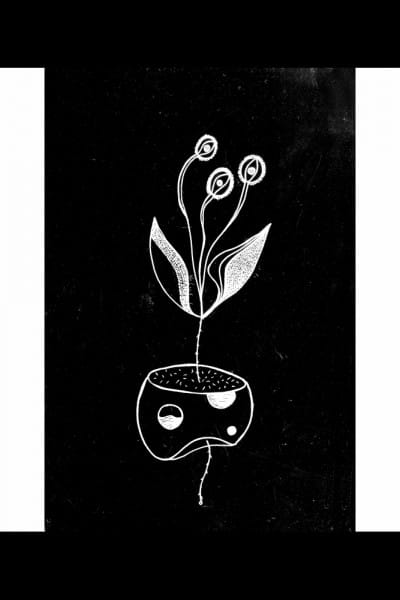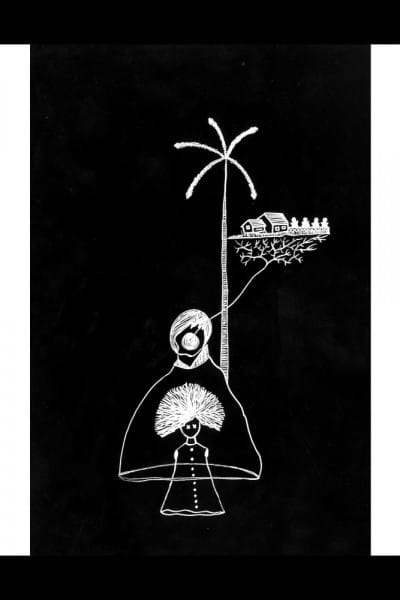Travels with the ghost of childhood

Nauroze could recall each strange detail about that summer that led to monsoon with the greatest clarity. She was a child invested in nostalgia, always dipping in and out of a longing for a wondrous past, while trying to adjust to present realities. She was also a child of deep inhibitions; fear and trepidation sat on her spectrum of most familiar emotions.
But, during those three months, away from the vast, undulating sand dunes and the rolling desert hill of her other home, she experienced something different. She experienced a newness and a chance at unadulterated happiness. Such as the joy of playing hide and seek for countless hours, eating meals under dimly lit tungsten bulbs inside a makeshift kitchen, getting soaking wet in the rain, falling flat on her face and discovering family secrets. Years later she would connect those stories of old shadows, monsters and fairies to the madness that raged within herself, her poor father, her little brother.
Nauroze had snippets of memory from this life in the sprawling, mansion meets village school, home. This was her father Shafiq’s village. This was also where her mother spent the first of her married years, before moving abroad to start a life with her father. There, she was born, as were her two little sisters.
The small tin-shed school came to sight first, and then a wide right would take you to a winding dirt-road; paddy-fields, green and feathery, lead the way to the village. Here stood the house, red and white, peeling in the humid Sylhet summers, the smell of jackfruit hanging heavy in the air.

Nearby, two simple tin-shed houses stood on each side, with tall supari trees swaying in the background. Above, cawed the crows of the house, just like she remembered them from her dreams. Nauroze felt a deep sense of belonging to this unknown but familiar house.
Here lived her grandmother, cousin brothers, chacha and chachiamma and a host of other people who claimed to be her relatives, who claimed to have raised her when she was a baby.
“I remember nothing. Who are these people? Why do I feel this compelling sense of love for this woman who claims to be choto fufu?” Nauroze, then 12 years old, kept thinking all night that first night.
In their fitful attempt to fall asleep, ma told her that this was the room in which Nauroze had spent the first few months as a child before flying off to her father in the far-away Middle East.
During that humid summer in that house, when the smell of molasses being reduced punctuated the air, Nauroze came across more of her type. She explored alleyways with her cousin brothers Nayef and Naqvi. She found the same shadows talked to them, as they did to her back in her home in the Middle East.
“I see two tops of tablas heading towards me, they get bigger and bigger. I am scared Nauroze Apu,” Nayef tells her one afternoon as they sit on the mound of rice her chacha had stored to be sold during peak season.
As they talked, Nayef trembling in fear at the two musical instruments hurtling towards him in full throttle, Nauroze felt a warm trickle pass below her, spread through her entire bottom. She knew then, Nayef had urinated himself in fear.
She did not know it then but as she grew up, the realisation dawned on her. Nayef was actually seeing the shadow, with those big bulbous eyes of hers moving towards him.
The shadow that her schizophrenic father thought he had left in that village home had in fact followed them to the Middle East. She brought back a little of that shadow with her. Nauroze knew, because the shadows travelled not with them, but within them.
There were many other such moments. Like the time Nayef and herself stayed locked in the rooftop of their house for hours while the elders frantically searched for them. They stared at the blue sky, lost in thoughts, both storytellers in their own right. Brother and sister from different sets of parents yet connected by one tether of a family lineage, by a crazy gene that got passed on from generation to generation at random. They knew in those moments that age would simply put them more at the mercy of their loopy minds.
They talked of her father, his mad temper and how scared she was of him. In their home in the Middle East, where Shafiq migrated as a 20-something man, he slowly moved up the social ladder. Nauroze got a chance at growing up in relative comfort. There were not many other Bangalees in their neighbourhood. In fact, the Bangalee community there mostly comprised working-class migrants, involved in the rampant development of the region in the post-Gulf War decades.
Nauroze shared with Nayef how she saw her parents fight violently, then make up the next moment. She told him how she hated going to school because of that one senior in her school who cornered her during bathroom breaks to rub his hands up her skirt. She told him how she would have relentless hallucinations every night as she tried to fall asleep.
With seven-year-old Nayef, the stories came flowing. They were both bound by their tormented minds.
Nayef and Nauroze would spend hours together, exchanging stories of familiar ghosts and shadows, the same ones that haunted their entire family. Some of their family was possessed by the madness and some others, tired out by the constant care the madness demanded.
She heard, yet again, the same stories of her grandfather, the same ones her father repeated in his non-lucid delirium. She saw the room where he was chained and held captive, as he fought off demons for entire nights. By her early adulthood, Nauroze knew something was deeply wrong with her family. They were not special or god’s children like her older relatives claimed to be, they were a family passing on a crazy gene. But each crazy was just a little different from the other. Each crazy philosophised differently. Chose their life’s trajectory differently. But she saw it now, they all moved in waves. And eventually all of them crashed and burned.
Her grandfather Ali, a successful businessman at first, a raging madman in his later years. His uncle, Shahadath, a roaming mystic, who claimed to have walked to Sylhet from Baghdad to spread the word of god, walked naked through the village in his final years before withering away. She knew her father too would be one of them. A bright glow, before the wick gave away. It was simply a matter of time before the decay began.
Nauroze returned to their home in the Middle East after that one summer and started school again. As summer rolled to winter and yet another summer came by, Nauroze tried, much against her will, to get back to her old routine. But she failed. Everyday, she found herself praying quietly for a chance to return to Bangladesh. The sugary, tube-well water sherbet, bananas and toast for evening snacks during that far away summer were still vivid in her memory.
Still, she knew she had to navigate this desert city and bide her time before she could return. But return would be sooner than she had anticipated.
One afternoon, after she returned from school, she saw her mother crumpled with the telephone set in her hand, almost livid, screaming into the phone “What do you mean he does not recognise us? How will I care for the business on my own and who will look after the children? No, no you cannot keep him in a lock-up. Stop with the hujurs. Take him to a hospital. He is mad.”
To be continued …

 For all latest news, follow The Daily Star's Google News channel.
For all latest news, follow The Daily Star's Google News channel. 



Comments